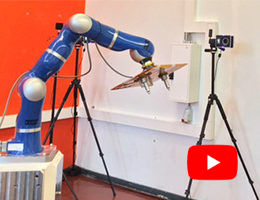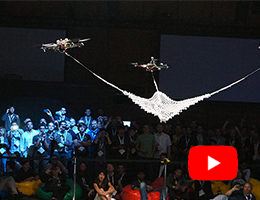What are your requirements?
- Do you need a system which is able to measure the exact 3D location and orientation of any number of objects in a specific volume?
- Would you like to measure the objects’ positions and orientations in real time, and stream the measurements further with a latency of only a couple of milliseconds?
- Do you need a straightforward way to integrate the real-time stream of measured 3D positions and orientations in your own, or in other 3rd party software – for example to implement a real-time control loop?
What solutions do we offer?
- We offer 6 DOF (Degree-Of-Freedom) tracking volumes of differing sizes, from smaller than 1m3 to about 30m x 30m x 30m, with a typical accuracy of 1mm or better. The accuracy depends mainly on the size of the capture volume and the number of cameras.
- The Vicon Tracker software has been specially developed for the typical engineering workflow – you can, for example, define an object with only two mouse clicks. Once defined, the object’s position and orientation will immediately start streaming in real time.
- The integration of the real time data stream with other software is made easy because of the DataStream SDK (Software Development Kit). The SDK is available for several programming languages (e.g. C++, .NET, Python and MATLAB). Several interfaces to popular VR and scientific software packages have already been developed, for example Simulink, LabView, Siemens Jack and VR Juggler.
- Check out the FAQ below for more questions and answers.












